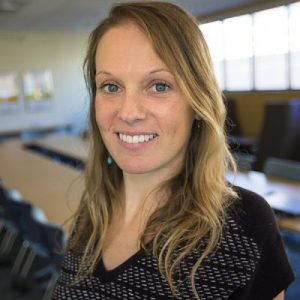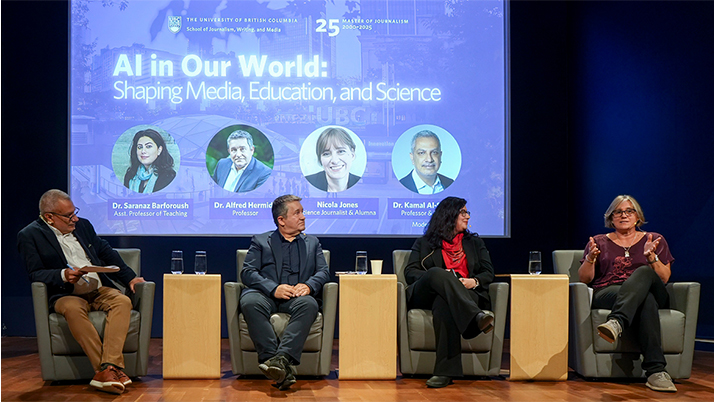Shannon Dooling graduated with a Master of Journalism degree in 2012. Dooling is an investigative reporter for WBUR, Boston’s NPR news station, working in collaboration with ProPublica. Her stories focus on immigration and criminal justice, and her work can be heard nationally on NPR and Here & Now. At UBC, she was part of the International Reporting Program which she said helped lay the foundation for her future investigations. Here’s what she had to say about her time at her alma mater.


How did you enter the field of journalism?
I did my bachelor’s in political science and assumed like most political science graduates in the United States that I was going to go to law school. I took the L-SAT twice and decided to wait a year before applying to law school. I’m glad I did because it definitely would not have been the right path for me. So, I went into the non-profit world after undergrad which was on the other side of the coin from journalism. I was the one who was writing the news releases and trying to drum up attention for different causes and things like that and I really enjoyed that.
I think I’m always someone who feels like I need to be mission-driven in my line of work, and in my career. So, I did enjoy working in the nonprofit field. But at a certain point, after probably six or seven years, I was itching to get back to school, I knew I wanted an advanced degree and it’s just like a light bulb went off. I was like, what about journalism? It encompasses all these skill sets that I believe I have, and that other people tell me I have, and would give me a little bit more of a voice and the ability to cover a lot of different things, as opposed to sort of being pigeon-holed into one area.
Why did you choose UBC?
For starters, it’s just a gorgeous part of the world and that was, I have to be honest, a big part of the draw for me. And I also was really, really drawn to the International Reporting Program (Global Reporting Program). I just thought that it was the only program I could find for a grad-school program, whether it was in the US or in Canada or abroad, that guaranteed you the opportunity to do some international reporting as a graduate student, and that was really appealing to me. For me, those two things sealed the deal. Even as an international student, the tuition was very affordable; so UBC had all the right elements and I’m glad that that’s where I ended up getting some of my training.
How was it being part of the International Reporting Program?
It was great. We went to Brazil and did field reporting there about these massive hydroelectric dams that were being constructed in the Amazon region of the country and covered the backlash around displacement and issues around that. It was awesome, I learned a tremendous amount about the concept of parachute reporting, what it means to be in a place for a short amount of time and be respectful of, you know, the culture and the customs, but also get the story that you came there to get. We relied on local experts, and really tried to get a feel of how people who will be living there when you leave are feeling about the topic that you’re reporting on. That ground experience prepared me really well actually for some international reporting that I’ve done since.
How would you describe your two-year J-School experience?
At that time, it was called the UBC School of Journalism and the way the curriculum was set up was that we got a bit of a taste of different mediums. We had digital and writing for online, we had a stretch where we were focused more on radio and audio collection, and then a segment for video and broadcast. And I just remember falling in love with radio at UBC. I attribute that which I’m sure a lot of your current and former students do to Kathryn Gretsinger and her love and mastery of the craft. I distinctly remember sitting in one of the classrooms in the School and she had us do this practice where she was just like, “close your eyes, put your head on the desk, and listen to these stories”. She basically convinced me that radio is the most visual of mediums, which I know is counterintuitive, but that really sort of, in a lot of ways pointed my trajectory in the way of public broadcasting. I then got a radio internship the year between year one and year two, and I’ve been in public radio ever since.
Can you share some of your internship experiences with us?
Yeah, sure. I interned at New Hampshire Public Radio for a few reasons. One, that’s my home, that’s where my family was. I was a little bit homesick and ready to kind of spend some time back home for a few months. But also, because it is a small shop, it’s a small newsroom, they were doing really great work at the time, they still are. A lot of the staff and faculty at UBC were really good at explaining like, yes, shoot for the stars, go for the New York Times internships, or the national outlets, but understand that you’ll probably get more responsibility and more opportunity to create a reel of sound or get some guidelines if you’re in a smaller shop where they need the people to be doing the work and you’ll gain a little bit more experience that way. So that’s the route I went. And in one way or another, it got me into WBUR which is where I work right now, the Boston NPR station, which is one of the largest in the US.
You have been working at WBUR post-graduation. How is that like?
I’ve been in the newsroom at WBUR for about nine years now, which is nuts. I started as a freelance producer for a daily live, local news show. Then I was hired on full time as a field producer for the host of our local morning edition program. From that position, I went into reporting full time which was at the end of the Obama administration. I fell into the beats of immigration reporting and got to travel to El Salvador and Honduras and cover the motivating factors for some of the migration from Central America to communities like Boston and greater Boston, which has a really vibrant Central American community. I was able to kind of localize some of the national stories that we were hearing, especially during the Trump administration. And so, I was an immigration reporter full time for about five years. For the last seven or eight months, I’m now on the investigative team at WBUR. It’s been a big change of pace, a big change of skill sets, I’m learning a lot, which is exactly what I wanted. I wanted to find the next challenge, take a step back from daily reporting and put myself in a position where I have to become an expert in a whole host of different topics. So instead of enduring the 24-hour news cycle every day, I’m now trying to figure out how to endure reporting on the same story for five or six or seven months and still have the creativity and the drive to propel the story forward without just becoming completely sick of it, which I will be honest, I’m still finding that balance and learning a lot about. And that’s exactly what I wanted to be doing at this point in my career, just learning some new skills.
What would you say are your biggest takeaways from J-school?
I think the ability and the importance of listening in this field is something that you know, I feel like I learned the hard way in some instances, meaning, I’d sit there and get an interview and because I was so focused on sort of ticking through my questions or making sure my equipment was working properly or whatnot, I wasn’t as engaged in the moment with what was actually being said in the conversation that was happening. I think I learned the importance of honing that skill and continuing to hone the skill of listening while I was at J-school. Also, quite honestly, the pace of grad school and the pace of J-school really prepared me for some of the nonstop immigration coverage that I was part of for the last four or five years. The ability to kind of think critically about story ideas, and, you know, maybe try to not pursue the story that everyone is pursuing, but sort of look on the periphery of that and try to get an idea of, you know, what’s not being told here or what’s not being asked.
Would you like to leave some advice for our current students?
One thing that I’ve always sort of tried to keep in mind for myself is sometimes it’s just as important to try something, try a position or an internship or a fellowship, and see whether you like something, whether it feels like a good fit. If it’s not a good fit, sometimes that’s just as important as finding something that is a good fit. Understanding what you don’t want to be doing, where your passion does not rest is sometimes just as important to have so that you can fall into your dream job. I think even more importantly, I’ve been in the same newsroom for seven or eight years now, but I’ve pushed myself out of my comfort zone repeatedly. That’s important in terms of personal growth and professional growth — to find those opportunities where you can challenge yourself and bring your journalism to a new level.


